Advertiser Disclosure
All About Cookies is an independent, advertising-supported website. Some of the offers that appear on this site are from third-party advertisers from which All About Cookies receives compensation. This compensation may impact how and where products appear on this site (including, for example, the order in which they appear).
All About Cookies does not include all financial or credit offers that might be available to consumers nor do we include all companies or all available products. Information is accurate as of the publishing date and has not been provided or endorsed by the advertiser.
Editorial Policy
The All About Cookies editorial team strives to provide accurate, in-depth information and reviews to help you, our reader, make online privacy decisions with confidence. Here's what you can expect from us:
- All About Cookies makes money when you click the links on our site to some of the products and offers that we mention. These partnerships do not influence our opinions or recommendations. Read more about how we make money.
- Partners are not able to review or request changes to our content except for compliance reasons.
- We aim to make sure everything on our site is up-to-date and accurate as of the publishing date, but we cannot guarantee we haven't missed something. It's your responsibility to double-check all information before making any decision. If you spot something that looks wrong, please let us know.
Best for Premium Features
-
Antivirus software offering reliable security
-
Simple yet powerful interface tools
-
Perfect protection score in third-party tests
-
Premium features incur additional subscription fees
Best for Cloud-Based Security
-
Fast, cloud-based scans
-
Ransomware reversal technology
-
Internet Security Plus plan required to clean device
If you don’t use an antivirus program yet and are trying to choose between Webroot and Bitdefender, we want you to know there is no wrong choice. Both products offer solid antivirus protection. Bitdefender has third-party test scores that will give you peace of mind for securing your device along with features like ransomware and phishing protection. And Webroot is no slouch, offering cloud-based scans and identity protection.
Are you ready to get your hands on Webroot antivirus software for serious security without paying a fortune? Perhaps you’re leaning toward Bitdefender for simple but powerful interface tools and near-perfect protection scores. We take a deeper look to help you decide.
Bitdefender vs. Webroot: prices
Bitdefender vs. Webroot: features
Bitdefender vs. Webroot: test results
Bitdefender vs. Webroot: compatibility and ease of use
Bitdefender vs. Webroot: customer service
Bitdefender vs. Webroot FAQs
Bitdefender vs. Webroot: which is better?
Bitdefender vs. Webroot review at a glance
Bitdefender has prices ranging from $14.99–$59.99/first yr, depending on the number of devices you want covered and if you want protection for macOS and iOS. Webroot currently has four plans starting at $23.99/first yr and going as high as $77.99/first yr. You can see that Bitdefender’s starting prices are more budget-friendly.
With the Webroot subscriptions, you get a firewall and network connection monitor with all plans, and you can get coverage for up to five devices. Bitdefender will protect up to ten devices and includes limited VPN protection with all plans.
- Bitdefender: Best for users who enjoy some premium features without paying a premium price
- Webroot: Best for people who like a cloud-based system that can work without slowing down your device
Bitdefender vs. Webroot compared
 Bitdefender |
 Webroot |
|
| Starting price | Starts at $59.99/first yr | Starts at $23.99/first yr |
| Max number of protected devices | 10 | 5 |
| 24/7 customer support | ||
| Compatibility | Windows, macOS, Android, iOS | Windows, macOS, Android, iOS |
| Free version | ||
| Phishing protection | ||
| Ransomware protection | ||
| Ad blocker | ||
| Learn more | Get Bitdefender
Read Bitdefender Review |
Get Webroot
Read Webroot Review |
One of the biggest differences between these two products is the device coverage you can get. Bitdefender Premium Security will protect up to ten devices, whereas Webroot will only protect up to five. With Bitdefender, you also get 24/7 customer support. Webroot doesn’t offer that feature.
If you’re looking for a free antivirus to start your security journey, Bitdefender offers a free version for Windows and Mac users. It also gives you live customer support with the free version, which is something you won’t get from all free antivirus products.
Bitdefender vs. Webroot: prices
 Bitdefender |
 Webroot |
|
| Price range | $14.99–$59.99/first yr | $23.99–$77.99/yr |
| Best value plan | Bitdefender Total Security for $39.99/first yr | Webroot Internet Security Plus for $35.99/first yr |
| Money-back guarantee | Yes, 30-day | Yes, 70-day |
| Learn more | Get Bitdefender
Read Bitdefender Review |
Get Webroot
Read Webroot Review |
The prices for Bitdefender and Webroot are similar for the highest tiers. There is only a $2 difference between them. Bitdefender’s basic plan is cheaper, but Webroot certainly doesn’t break the bank either considering this is the cost for a year's worth of coverage.
Bitdefender’s best value is the Total Security plan for $39.99/first yr. It covers five devices and protects against adware. You’ll also get parental controls and webcam and microphone protection.
With a cost of $35.99/first yr, we chose Webroot’s Internet Security Plus plan for its best value. It covers three devices for the first year. For that price, you also get protection against dangerous websites and password management across all your devices.
You’ll get the most essential features with both these value plans. The best antivirus software comes with phishing and ransomware protection, and neither of these programs will bog down your resources. Both providers offer some identity protection features if you splurge on the premium plans.
Bitdefender offers a 30-day money-back guarantee if you’re unhappy with the product. We’re blown away by Webroot’s 70-day money-back guarantee. That’s more than many antivirus products offer. The longest we’ve seen in most cases is 60 days.
Bitdefender vs. Webroot: features
| Feature |  Bitdefender |
 Webroot |
| Manual and scheduled scans | Yes, for Windows | |
| Phishing protection | ||
| Ransomware protection | ||
| Firewall | Yes, for Windows only | |
| Password manager | ||
| VPN | ||
| Device optimization tools | Yes, for Windows only | |
| Parental controls | ||
| Ad blocker | ||
| Learn more | Get Bitdefender
Read Bitdefender Review |
Get Webroot
Read Webroot Review |
Bitdefender offers manual and scheduled scans for Windows. It has three scanning options for macOS, which are Quick Scan, System Scan, and Custom Scan. None of those are available for scheduled scans. Unlike Bitdefender, Webroot does allow scheduled scanning for either operating system, and the interface is easy to set up and use.
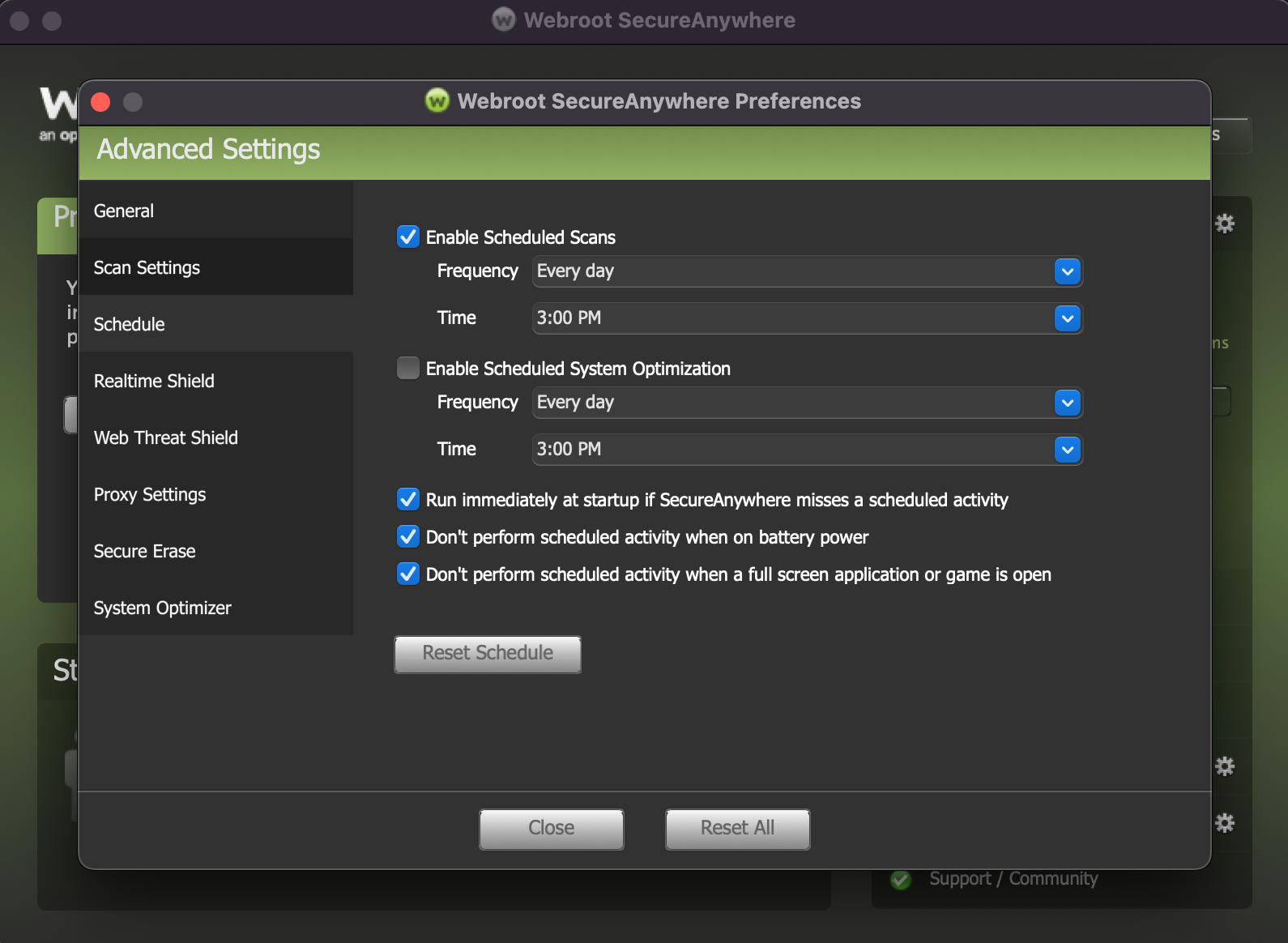
Also note that Bitdefender includes a firewall for Windows users, but not for Mac users. You also won’t get device optimization tools if you use a macOS. That can be a definite bummer for Apple fans who otherwise might like the options included with Bitdefender. Device optimization tools can be used to clean up old files and speed up your machine. Many users like this feature because it helps them tidy up their devices.
Bitdefender does come with an ad blocker that is helpful against those pesky, intrusive pop-ups that no one likes. There is also an anti-tracker that will show you the analytics of what has attempted to track your online activity and what’s been stopped.
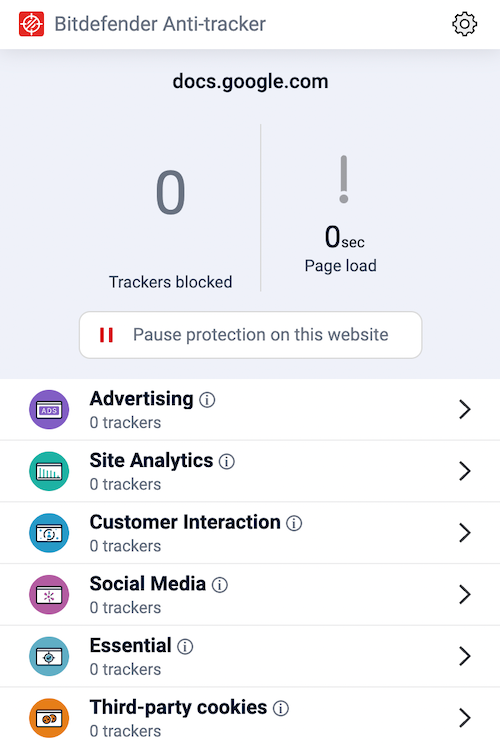
If you have a family, Bitdefender’s parental controls may interest you. You can see how much time your children have spent online and view which applications have been accessed.
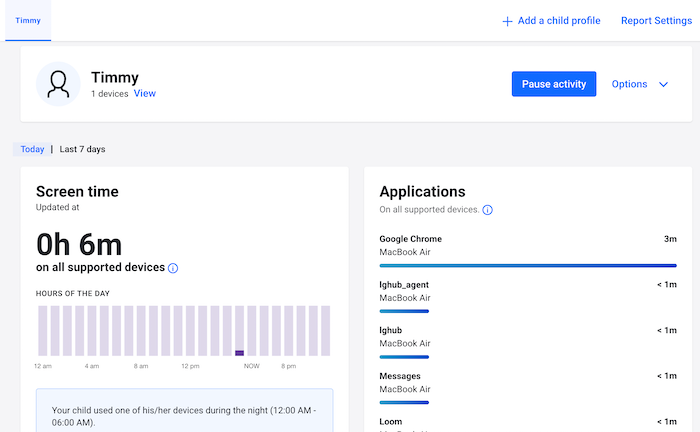
On the flip side, when you’re busy and don’t want to delve into your settings to find all the cool features of your antivirus, Webroot is a good choice. The software doesn’t take a toll on your system resources and supports both PC and Mac devices.
It comes with cloud-based scanning and real-time protection for phishing and malicious websites. In the Advanced Settings, it’s easy to customize scheduled scans. It even has a System Analyzer feature that shows you more specifics, like how much Ram you have and if you need software updates.
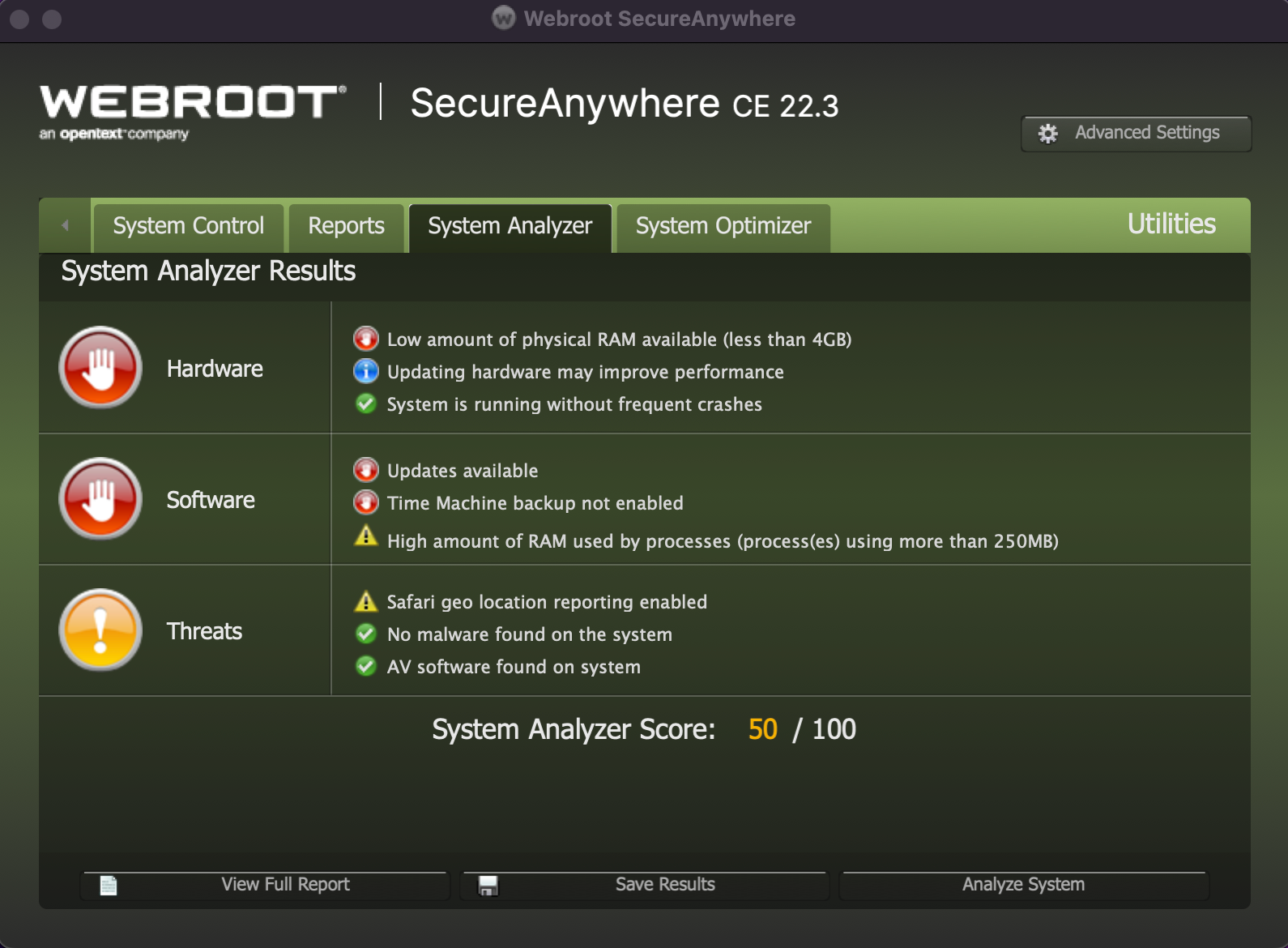
Bitdefender vs. Webroot: test results
When reviewing antivirus software, it’s crucial to us that we give you recommendations based on our testing and that of a third-party test site. We rely on these sites for clear results on how antivirus products perform in real-world environments with scenarios that can happen at any time.
Bitdefender AV-TEST scores
 Bitdefender |
|
| Windows score | 17.5/18 |
| macOS score | 18/18 |
| Android score | 18/18 |
| Learn more | Get Bitdefender
Read Bitdefender Review |
Webroot SE Labs scores
 Webroot |
|
| Total accuracy | 95% |
| False positives | 0% |
| SE Labs rating | 91.5% |
| Learn more | Get Webroot
Read Webroot Review |
For our review purposes, we generally try to use the same testing sites, but for this one, the antivirus products used two different ones. We will still compare the ratings and scores to show you how they stacked up when targeted by attacks that may happen to home users.
When checking the antivirus on Windows OS, Bitdefender scored 100% for protection against zero-day malware attacks. That beats the industry average of 99.4%. It didn’t slow down system performance as much as the industry average either. The going rate is 14% when launching popular websites, but Bitdefender scored 13% and 12% in May and June, causing less of a slowdown than your average antivirus. Bitdefender did, however, flag more false positives than the industry average in both May and June 2023.
The Webroot scores from SE Labs weren’t quite as good. The total accuracy that is found by combining the protection accuracy and legitimate accuracy was only 95%. That may not look too bad, but when you see that protection accuracy was 87%, that doesn’t give you much faith in the antivirus protecting you against malware. The protection score represents the antivirus’s ability to detect threats, so the result is a bit disarming.
Bitdefender vs. Webroot: compatibility and ease of use
 Bitdefender |
 Webroot |
|
| Windows | ||
| macOS | ||
| Android | ||
| iOS | ||
| Browser extensions | Chrome, Firefox, Edge, Safari, Opera | Chrome, IE, Edge, Firefox, Safari, Opera |
| Learn more | Get Bitdefender
Read Bitdefender Review |
Get Webroot
Read Webroot Review |
Bitdefender was easy to use, and the menus were organized, so we never felt overwhelmed when looking for options. Neither the full system scan or quick scan made a noticeable impact on our device’s performance, even with numerous web browsers and search tabs open.
One caveat is that the antivirus application and the browser hub come in two parts. The parental controls must be set up when logged into Bitdefender Central. Once we overcame that hurdle, the rest was a cinch. Remember, if you’re an Apple user there will be some features you won’t have like the firewall, scheduled scans, and a file shredder. Although that’s disappointing, it’s also not rare when using antivirus programs with a Mac.
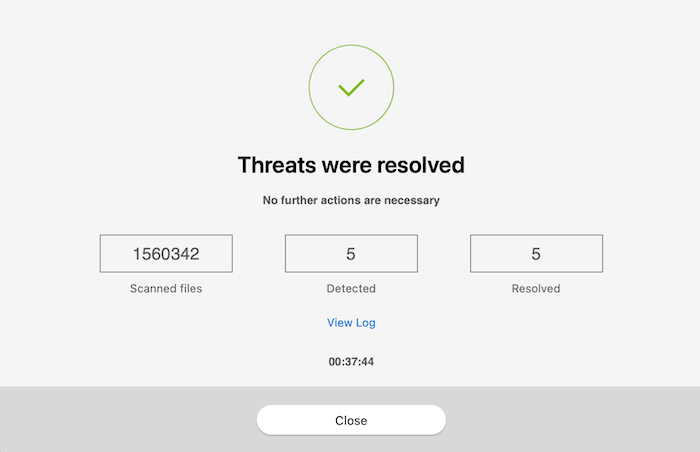
Webroot worked well during testing. We ran numerous scans using the full scan and quick scan features. We saw no system performance issues when using the software. That may be due to the cloud-based architecture. The system optimizer did take a while to run, but we weren’t bothered by this as it searched through hundreds of thousands of files attempting to free up hard drive space. Taking less than ten minutes seems reasonable when it helps your device perform better.
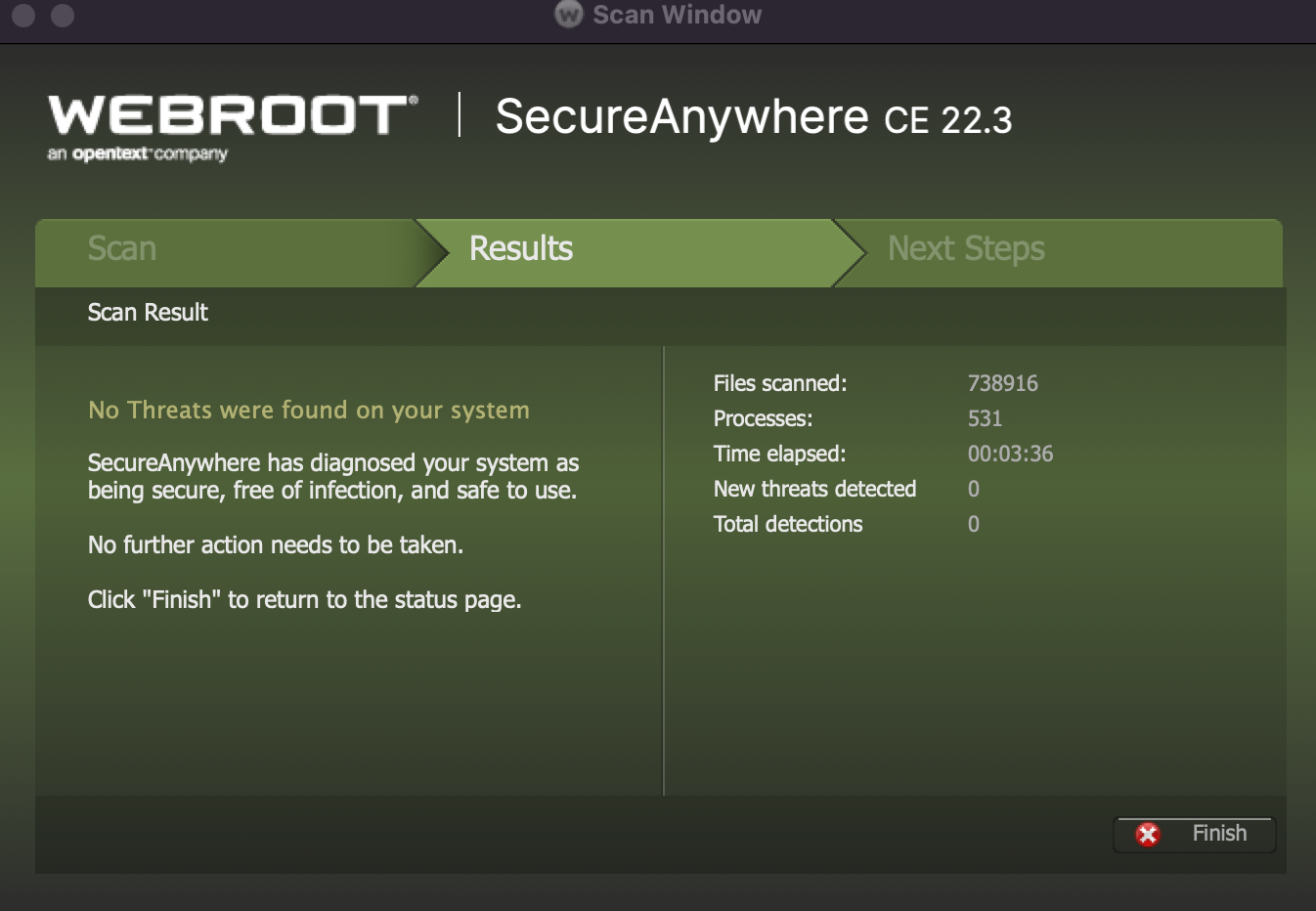
Bitdefender vs. Webroot: customer service
 Bitdefender |
 Webroot |
|
| 24/7 live chat | ||
| Phone | ||
| Support forums | ||
| Online guides |
Bitdefender has a wide array of customer-support options. We called them to get some information on features we were missing, like the firewall and device optimizer. The rep was helpful and friendly but seemed surprised that the macOS version was different from the Windows version. Still, he was courteous throughout the conversation.
Webroot doesn’t offer a stellar lineup of customer support options. You need to open a ticket to get help in most cases. There is a knowledge base where you can search for help if you’re in a hurry or reach out to the Webroot community for guidance. You can also try to call or use social media to ask questions on Facebook or Twitter. We really wish there was a live chat feature, though.
Bitdefender vs. Webroot FAQs
Is Webroot as good as Bitdefender?
When looking at the test results for Webroot, we are hesitant to report that it is as good as Bitdefender. If you want malware protection, Bitdefender seems the better option.
Is Bitdefender worth it?
Bitdefender is worth it if you want a safe antivirus that has good third-party test scores when checking for malware threats and performance issues.
Does Webroot catch ransomware?
Webroot does stop ransomware so that it cannot infect your device, and all Webroot plans come with ransomware protection. If Webroot spots an unknown app, it quarantines the app and prevents it from making any system changes on your device. It also monitors those unknown apps to see what changes they make to your system. All this is done using cloud-based intelligence.
Bitdefender vs. Webroot: which is better?
After comparing both antivirus products side-by-side, we like them both and feel that most users will be happy with either. When choosing the better antivirus, Bitdefender has more features that make it an all-around solid antivirus. You get parental controls, incredible customer support, reasonable prices, and a VPN. If you use Windows, you will have even more features like a firewall and performance optimization tools.
Still, the main reason for using an antivirus is to protect your system from malware and cybercriminals who want to wreak havoc on it. The testing scores alone show that Bitdefender is a definite top contender for antivirus software that provides security and won’t leave you bankrupt after buying it. Webroot, unfortunately, has some catching up to do when it comes to malware protection.
Bitdefender vs. Webroot alternatives
If neither of these antivirus products tickles your fancy, there are other options. We have a few honorable mentions you might prefer.
- Norton 360: Norton includes an incredible security suite that offers real-time protection, parental controls, secure VPN, and more. Norton consistently scores well in third-party tests, and we like that you can choose to bundle its identity theft protection service, LifeLock, with its antivirus for double the protection.
Get Norton | Read Our Norton Review - Avast: With a AAA rating from SE Labs, Avast gives you premium security with competitive pricing and a 60-day free trial to test the product. Its Premium Security plan includes a network inspector feature that warns you if a Wi-Fi network isn't safe.
Get Avast | Read Our Avast Review - McAfee: McAfee offers plans to protect unlimited devices with plenty of extras like a firewall, parental controls, and a file shredder. And if scams and identity theft are on your radar, it's reassuring to know McAfee antivirus comes with identity protection included. You'll also get its WebAdvisor tool, which blocks malicious websites.
Get McAfee | Read Our McAfee Review
-
Antivirus software offering reliable security
-
Simple yet powerful interface tools
-
Perfect protection score in third-party tests
-
Premium features incur additional subscription fees
[1] Test Bitdefender Internet Security 26.0 for Windows 10
[2] Test Bitdefender Antivirus for Mac 9.3 for MacOS Ventura
[3] Test Bitdefender Mobile Security 3.3 for Android
[4] SE Labs Endpoint Security Home Protection Webroot Antivirus







